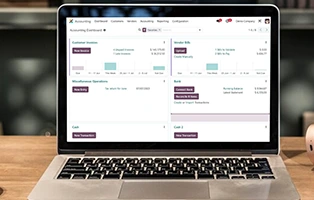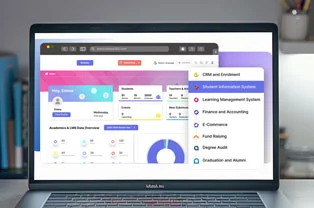
ERP Implementation Challenges
An Enterprise Resource Planning (ERP) system implementation acts like a transformative project for various organization, that helps the user to get a streamlined processes, works on improving the overall data visibility, and enhance the process of decision-making. But in this blog particularly we will read about the failure of the process and how it can significantly lead to the overall financial losses, operational disruptions, and damage to a company's overall reputation.

Understanding ERP Implementation Risks
Implementing an Enterprise Resource Planning is the process of transforming the organization’s structure into a progressive operational unit. This process can be complex for many users, The Enterprise Resource Planning is designed in such a way that it can integrate and streamline business processes for numerous departments, on the other hand it can also provide the benefits and may be times it can lead to significant challenges and failures.
The common ERP Implementation risks we Solve
Unworkable Timelines
One of the most common ERP implementation risk is that the user attempts to deploy an ERP system in an unrealistic timeframe that is equally to impossible on the practical ground.
Ineffective Testing
Insufficient system testing before the actual rollout can further lead to the loopholes and a significant operational disruptions.
Poor Change Management
There can be times when the process is failing to address the human side of ERP implementation which will lead to the resistance and ultimately disruption in the overall project.
Lack of Clear Objectives
Without clearly defined goals and objectives, it is difficult to measure the success of an ERP implementation.
Insufficient Budget
Insufficient funding can also compromise and can even negatively impact the quality of the implementation that contributes to another common ERP implementation risk.
Wrong Implementation Partner
Selecting an implementation partner is very important. The user should necessarily work with the experts which helps them solve the significant problems.
Data Migration Issues
Migrating data from the current users systems to the new ERP system can be complex and prone to errors for most of the users.
Technical Issues
Technical glitches, like the software bugs, and system integration problems can also contribute to the common ERP implementation.
Scope Creep
Allowing the scope of the project to expand and if the user lacks in the proper planning and resource allocation it contributes to the delays and cost overruns in the ERP implementation process.

Issues We Solve
Resistance to Change
The most common set of challenge that the ERP implementation goes through is the resistance to change which means the employees feel worried about the loss of data, adaption of new system, and other factors, the challenge also bring the anxiety about job security and a lack of knowledge about the new processes.
Improvement Strategies
Engagement and Communication: To tackle the challenge the user have to involve the employees early in the process and build an interactive communication that can benefit the ERP system clearly. Also, on the other hand it is very important to regularly update the system and create some open forums for in-depth discussion in order to eliminate the future fears.
Comprehensive Training: Another mitigation strategy you can follow is to provide extensive training that can fit the different user roles, through which the employees feel confident in using any new system.
Data Migration Complexity
Data migration is the process of moving a particular set of data from one place to another. This transfer of data can be a critical phase in ERP implementation and there can be times when the user may face the issues like disturbed data quality, format discrepancies, incomplete records, etc. in order to eliminate these challenge the user have to follow:
Improvement Strategies
Data Cleansing: It is always advisable to clear your unwanted data before the data migration process which will eliminate the chances of duplicated data and errors in the system. This step also benefits the user in providing the high-quality data transfer.
Detailed Mapping: The user should always prepare a comprehensive data mapping strategy which will highlight all the important component and will also act like a guideline on how to integrate the existing data into the new system.
Project Management Issues
The project management plays a vital role in the successful ERP implementation, but what if you face challenges in the same. These challenges can easily hamper the overall functionality of the system. The complexities can be scope creep, resource allocation, and communication breakdowns.
Improvement Strategies
Robust Project Management Framework: The user can go with various project management methodologies like Agile or Waterfall according to their progress and maintain the structure and accountability within the implementation process.
Regular Progress Reviews: Go with the implementation partner like o2b technologies that provides a frequent check-ins into the progress and also adjust the plans as necessary.
Budget Overruns
There are many instances when the user may extend their own budget from being overwhelmed with the wide range of functionalities offered by ERP. Hence it also brings the unforeseen complexities and burdens the customer with Cost overruns and overall financial strain on organizations.
Improvement Strategies
Detailed Budget Planning: The user always have to do a proper pre- implementation planning that also includes the comprehensive budgeting on the potential contingencies and the additional costs that may associates with the employee training, customization, and support.
Change Control Processes: The process should have strict change control processes that can eliminate any change in the scope system which can eventually impact the cost.
Unclear Business Processes
There are still many business that have an unclear or poorly defined business processes that can complicate the implementation process of the ERP and it is very evident that if an organization does not have a clear understanding of their own workflows, they will definitely struggle with the alignment of the ERP system.
Improvement Strategies
Process Mapping: Craft a process mapping before the actual implementation process and document the users current workflows and also understand the gaps or inefficiencies in the system.
Stakeholder Involvement: Get experts and stakeholders from various departments in the initial phase like the mapping process to ensure all the perspectives are considered.
Insufficient Training
Inadequate training can also be another set of complexity that further leads to poor user adoption in the ERP system, it also hamper the ventures effectiveness and impact the return on investment (ROI) due to which ultimately the employees may resist using a system and do not feel comfortable with the same.
Improvement Strategies
Tailored Training Programs: The venture should provide extensive training programs which can be used by different employees in various sector and also the learning style of these sessions should be simply and easy to understand that covers all the comprehensive operation of system functionalities.
Ongoing Support: Go with good ongoing support mechanisms that can help the desks or user groups, as an assistant to the post-launch.
Steps we follow for Recovering from a Failed ERP Implementation
Assess the Situation
The first step we follow is to conduct a thorough assessment of the failed implementation and also identify the root causes of the problems and solve it accordingly.
Develop a Remediation Plan
We work on developing a detailed plan that helps you address the identified problems.
Secure Executive Support
The team here gives you strong support from the top management for the remedy plan and boost the ERP implementation.
Re-evaluate the ERP System
Determine whether the chosen ERP system by the user is still the best fit for the organization's needs or they have to change it according to the demand.
Re-plan the Implementation
We then help0 the user to develop a new implementation plan that addresses the main problems that initially led to the failure.
Communicate Effectively
Communicate openly and honestly with all the key stakeholders throughout the remedy process for a better ERP implementation.
FAQs
What does the failed ERP implementation actually means?
The failed ERP implementation can be due to various factors which includes the poor planning, the failed ERP implementation can also be lack of user adoption, not having the proper training, and also not serving the business objectives properly.
How is the failure rate of ERP implementations when the user don’t choose the right implementation partner?
The ERP implementations failure will gradually increase by 75%, when the user do not conduct a good research and choose an unsatisfactory ERP implementation partner.
Which is the best ERP Implementation partner?
Partners like o2b technologies can be taken into consideration when choosing the best ERP Implementation partner.
What are the most common failures of ERP implementation?
There can be many risks which comes with the ERP implementation, like the inadequate implementation timelines. The risks can also be due to the lack of a proper software testing by the experts, poor change management, and much more.
What complicates data migration in ERP projects?
The data migration is an extensive process; hence it does have the challenges like the time, cost, repetition of data also it comes with the integrity issues, the stakeholder support also plays a major role.




























































 USA
USA INDIA
INDIA